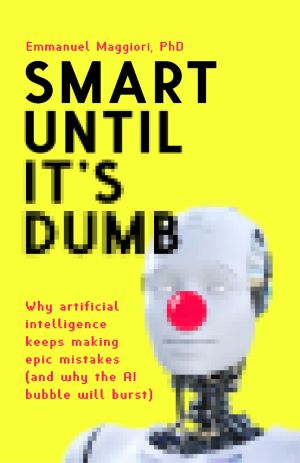Smart Until It’s Dumb

I wanted to continue my AI discovery, so I looked at another book on the subject. The Smart Until It’s Dump by Emmanuel Maggiori is a refreshingly compact book. Finally, a book that does not want to reach 250 pages or even more. Most books are greedy not just on the number of pages but on the price too. This book is different. I was able to complete the 177 pages in just three sessions.
With its subtitle “Why artificial intelligence keeps making epic mistakes (and why the AI bubble will burst)”, you do not need to guess much about what the book is about. The author is not an inexperienced AI analphabet who shares his hypothetical theories on the subject, but an experienced AI expert who sees not just the capabilities of the AI but also its limitations. It makes the book authentic and compensates for today’s overreaction to AI.
I found the book to be goal-oriented. It delivers on its promise, as indicated by the title, but it is far from being a comprehensive guide on AI. However, it can serve as a valuable supplement to other literature on the subject. It jumps right to machine learning and deep learning in the first chapters, already spotting specific weaknesses. The rest of the book exclusively focuses on the challenges of AI from different perspectives, such as business, research and human. The author illustrates them through his own experiences, projects and stories, which makes them very authentic.
Some of the most intriguing examples discussed were the difficulties faced by self-driving cars and the vulnerabilities of intelligent vehicles’ traffic sign recognition systems. Additionally, there was mention of possible attacks on image categorization and labelling, such as when an AI mistakes a turtle for a rifle. The most concerning story shared was about companies misleading themselves when their AI-related expectations are not met.
Despite the difficulty of the subject to me and some terminologies, such as random forest, convolutional neural network (CNN), long short-term memory (LSTM), the book was easy to follow and always gave necessary explanations to the used terms.
What I liked the most:
- It delivers what it promises, but nothing more.
- Short and effective.
- It shows the true side of the AI world, not the sunny side.
What I didn’t like much:
- It is not comprehensive on the subject of AI. You should look for some other literature as well.

Comments